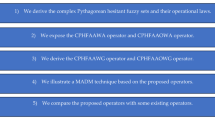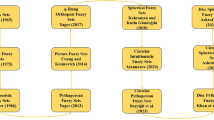Abstract
Fuzzy programming has been discussed widely in literature and applied in such various disciplines as operations research, economic management, business administration, and engineering. The main purpose of this paper is to present a brief review on fuzzy programming models, and classify them into three broad classes: expected value model, chance-constrained programming and dependent-chance programming. In order to solve general fuzzy programming models, a hybrid intelligent algorithm is also documented. Finally, some related topics are discussed.
Similar content being viewed by others
References
Bouchon-Meunier B.,V. Kreinovich, A. Lokshin and H.T. Nguyen. (1996). “On the Formulation of Optimization Under Elastic Constraints (With Control in Mind),” Fuzzy Sets and Systems 81, 5–29.
Buckley, J.J. (1988). “Possibility and Necessity in Optimization,” Fuzzy Sets and Systems 25, 1–13.
Buckley, J.J. (1990a). “Stochastic Versus Possibilistic Programming,” Fuzzy Sets and Systems 34, 173–177.
Buckley, J.J. (1990b). “Multiobjective Possibilistic Linear Programming,” Fuzzy Sets and Systems 35, 23–28.
Buckley, J.J., and Y. Hayashi. (1994). “Fuzzy Genetic Algorithm and Applications,” Fuzzy Sets and Systems 61, 129–136.
Buckley, J.J., and T. Feuring. (2000). “Evolutionary Algorithm Solution to Fuzzy Problems: Fuzzy Linear Programming,” Fuzzy Sets and Systems 109, 35–53.
Charnes, A. and W.W. Cooper. (1959). “Chance-constrained Programming,” Management Science 6, 73–79.
Dubois, D. and H. Prade. (1988). Possibility Theory. New York: Plenum.
Inuiguchi, M., H. Ichihashi, and Y. Kume. (1993). “Modality Constrained Programming Problems: An Unified Approach to Fuzzy Mathematical Programming Problems in the Setting of Possibility Theory,” Information Science 67, 93–126.
Inuiguchi, M., and J. Ramík. (2000). “Possibilistic Linear Programming: A Brief Review of Fuzzy Mathematical Programming and a Comparison with Stochastic Programming in Portfolio Selection Problem,” Fuzzy Sets and Systems 111, 3–28.
Kruse, R., and K.D. Meyer. (1987). Statistics with Vague Data. Dordrecht: D. Reidel Publishing Company.
Kwakernaak, H. (1978). “Fuzzy Random Variables I,” Information Sciences 15, 1–29.
Kwakernaak, H. (1979). “Fuzzy Random Variables II,” Information Sciences 17, 153–178.
Liu, B. (1997). “Dependent-chance Programming: A Class of Stochastic Optimization,” Computers and Mathematics with Applications 34, 89–104.
Liu, B. and K. Iwamura. (1998a). “Chance-constrained Programming with Fuzzy Parameters,” Fuzzy Sets and Systems 94, 227–237.
Liu, B. and K. Iwamura. (1998b). “A Note on Chance-constrained Programming with Fuzzy Coefficients,” Fuzzy Sets and Systems 100, 229–233.
Liu, B. (1998). “Minimax Chance-constrained Programming Models for Fuzzy Decision Systems,” Information Sciences 112, 25–38.
Liu, B. (1999a). “Dependent-chance Programming with Fuzzy Decisions,” IEEE Transactions on Fuzzy Systems 7, 354–360.
Liu, B. (1999b). Uncertain Programming. New York: John Wiley and Sons.
Liu, B. (2000). “Dependent-chance Programming in Fuzzy Environments,” Fuzzy Sets and Systems 109, 95–104.
Liu, B. and K. Iwamura. (2001). “Fuzzy Programming with Fuzzy Decisions and Fuzzy Simulation-based Genetic Algorithm,” Fuzzy Sets and Systems 122, 69–77.
Liu, B. (2001a). Fuzzy Random Chance-constrained Programming. IEEE Transactions on Fuzzy Systems Vol. 9, No. 5, 713–720.
Liu, B. (2001b). Fuzzy Random Dependent-chance Programming. IEEE Transactions on Fuzzy Systems Vol. 9, No. 5, 721–726.
Liu, B. (2001c). Random Fuzzy Variables and Random Fuzzy Programming. To appear in Fuzzy Sets and Systems.
Liu, B. (2001d). Random Fuzzy Dependent-chance Programming and its Hybrid Intelligent Algorithm. Technical Report.
Liu, B., and Y.-K. Liu. (2001a). Expected Value of Fuzzy Variable and Fuzzy Expected Value Models. To appear in IEEE Transactions on Fuzzy Systems.
Liu, Y.-K., and B. Liu. (2001b). Fuzzy Random Variables: A Scalar Expected Value. Technical Report.
Liu, Y.-K., and B. Liu. (2001c). Expected Value Operator of Random Fuzzy Variable and Random Fuzzy Expected Value Models. Technical Report.
Liu, Y.-K., and B. Liu. (2001d). Expected Value Models in Fuzzy Random Decision Systems with a Hybrid Intelligent Algorithm. Technical Report.
Luhandjula, M. K. (1983). “Linear Programming Under Randomness and Fuzziness,” Fuzzy Sets and Systems 10, 45–55.
Luhandjula, M. K. (1986). “On Possibilistic Linear Programming,” Fuzzy Sets and Systems 18, 15–30.
Luhandjula, M. K. (1989). “Fuzzy Optimization: An Appraisal,” Fuzzy Sets and Systems 30, 257–282.
Nahmias, S. (1978). “Fuzzy Variables,” Fuzzy Sets and Systems 1, 97–110.
Ostasiewicz, W. (1982). “A New Approach to Fuzzy Programming,” Fuzzy Sets and Systems 7, 139–152.
Puri, M.L., and D. Ralescu. (1986). “Fuzzy Random Variables,” Journal of Mathematical Analysis and Applications 114, 409–422.
Ramík, J., and H. Rommelfanger. (1996). “Fuzzy Mathematical Programming Based on some Inequality Relations,” Fuzzy Sets and Systems 81, 77–88.
Tanaka, H., P. Guo, and H.-J. Zimmermann. (2000). “Possibility Distribution of Fuzzy Decision Variables Obtained from Possibilistic Linear Programming Problems,” Fuzzy Sets and Systems 113, 323–332.
Yazenin, A.V. (1996). “On the Problem of Possibilistic Optimization,” Fuzzy Sets and Systems 81, 133–140.
Zadeh, L.A. (1978). “Fuzzy Sets as a Basis for a Theory of Possibility,” Fuzzy Sets and Systems 1, 3–28.
Zimmermann, H.-J. (1983). “Fuzzy Mathematical Programming,” Computers and Operations Research 10, 291–298.
Zimmermann, H.-J. (1985a). “Applications of Fuzzy Set Theory to Mathematical Programming,” Information Science 36, 29–58.
Zimmermann, H.-J. (1985b). Fuzzy Set Theory and its Applications. Boston: Kluwer Academic Publishers.
Author information
Authors and Affiliations
Rights and permissions
About this article
Cite this article
Liu, B. Toward Fuzzy Optimization without Mathematical Ambiguity. Fuzzy Optimization and Decision Making 1, 43–63 (2002). https://doi.org/10.1023/A:1013771608623
Issue Date:
DOI: https://doi.org/10.1023/A:1013771608623




